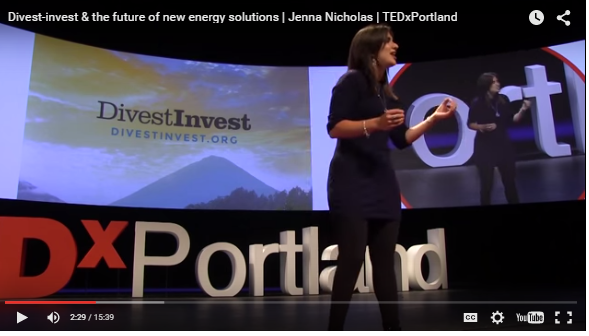Multimedia: A Fork in the Road for Fossil Fuel Investment

"An idea comes in a flash, and inspires others to make a difference." Such was the case for Jenna Nicholas when she had the chance to meet Desmond Tutu at the age of 12. Since then Ms. Nicholas, of DivestInvest.org, has harnessed the inspiration she received to affect positive change on the environment, and thereby on the humans who rely on it. In her TEDx presentation at the University of Portland, Nicholas contends that fossil fuels aren't as attractive an investment as commonly believed:
The most damaging misunderstanding about fossil fuels is that they are a safe investment. Quite the contrary: investing in fossil fuels is risky business. There is a carbon asset risk, a competition risk, and a regulatory risk.
…[O]f the [$27] trillion of fossil fuels underground, only $7 trillion of this is actually burnable. This $20 trillion differential is known as stranded assets. This means in order to keep climate change within the internationally agreed-upon standard of two degrees celcius and to avoid destroying our planet, this $20 trillion of fossil fuels cannot be burnt. Assets in the fossil fuel industry are greatly overvalued, and there is a huge volatility in fossil fuel share prices. Mark Carney, governor of the Bank of England, and Jim Yong Kim, President of the World Bank, and many others, have warned that many current fossil fuels will be deemed absolutely worthless.
Describing a variety of types of investment opportunities in clean energy and the the industries that support a clean energy-based and environmentally-friendly economy, Nicholas urges her audience to see the matter as a social justice, issue as well as an economic and environmental one.
By owning fossil fuels we are owning climate change.
Nicholas poses the question, “How does change happen? How do movements start?” Citing moments like the fall of the Berlin Wall, the end of slavery, and the independence of India, she posits:
What is the common denominator in these shifts? It is the power of the people, people like you and me. We understand that we can make a difference and that we… choose what sort of world we want to live in. … What will we choose?
Hungry for more Soundbites? Click here for thought-provoking social ideas, sizzling economic commentary and more that’s worth a listen.
This post was prepared by Daniel Wittenberg.
Comments are closed here.